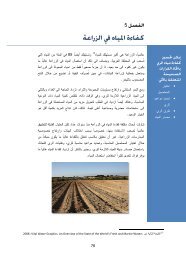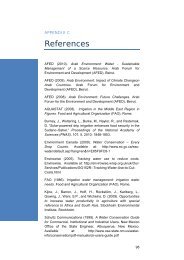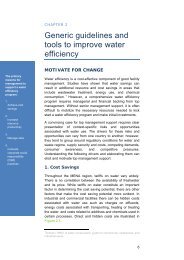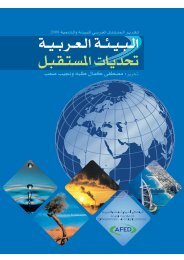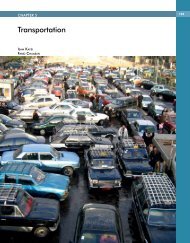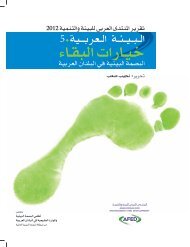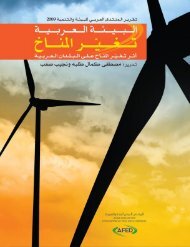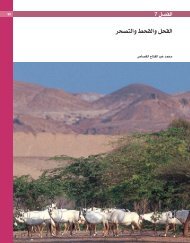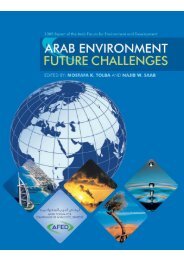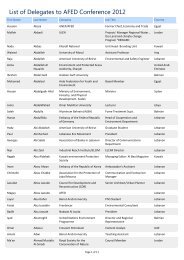Impact of Climate Change on Arab Countries - (IPCC) - Working ...
Impact of Climate Change on Arab Countries - (IPCC) - Working ...
Impact of Climate Change on Arab Countries - (IPCC) - Working ...
Create successful ePaper yourself
Turn your PDF publications into a flip-book with our unique Google optimized e-Paper software.
ARAB ENVIRONMENT: CLIMATE CHANGE 145<br />
ti<strong>on</strong>al accord <strong>on</strong> renewable energy trade within<br />
the WTO, and indirectly through the introducti<strong>on</strong><br />
<str<strong>on</strong>g>of</str<strong>on</strong>g> envir<strong>on</strong>mental goods and services (EGS),<br />
and through a call to legitimize the regulati<strong>on</strong> <str<strong>on</strong>g>of</str<strong>on</strong>g><br />
process and producti<strong>on</strong> methods (PPMs).<br />
III. ENERGY AS AN EMERGENT ISSUE IN<br />
THE WTO SYSTEM<br />
It is well known that oil, as well as coal, have l<strong>on</strong>g<br />
been kept outside the purview <str<strong>on</strong>g>of</str<strong>on</strong>g> the GATT and<br />
subsequently the WTO trading system. This was<br />
not at the behest <str<strong>on</strong>g>of</str<strong>on</strong>g> the <strong>Arab</strong> oil-producing countries,<br />
the majority <str<strong>on</strong>g>of</str<strong>on</strong>g> which were not members in<br />
the GATT, and later, were certainly not deal<br />
makers or breakers in the WTO. The producti<strong>on</strong><br />
<str<strong>on</strong>g>of</str<strong>on</strong>g> energy per se and its impact was never an<br />
issue in negotiati<strong>on</strong>s v for multiple reas<strong>on</strong>s: the<br />
multilateral system was more c<strong>on</strong>cerned with<br />
addressing import barriers rather than export<br />
restricti<strong>on</strong>s; such negotiati<strong>on</strong>s would fall victim<br />
to the politicizati<strong>on</strong> <str<strong>on</strong>g>of</str<strong>on</strong>g> oil as a strategic product;<br />
and perhaps most c<strong>on</strong>vincing, negotiating energy<br />
in the trading system never c<strong>on</strong>stituted an interest<br />
to the developed countries, which were unilaterally<br />
setting the trade agenda. The developed<br />
countries were neither keen <strong>on</strong> exchanging c<strong>on</strong>cessi<strong>on</strong>s<br />
am<strong>on</strong>gst themselves in oil or oil products,<br />
nor was it in their interest to pry open markets<br />
for oil. As such, the lack <str<strong>on</strong>g>of</str<strong>on</strong>g> interest <strong>on</strong> the<br />
part <str<strong>on</strong>g>of</str<strong>on</strong>g> the developed countries in subjecting<br />
energy to multilateral rules and regulati<strong>on</strong>s was<br />
the predominant factor in keeping oil and coal<br />
<str<strong>on</strong>g>of</str<strong>on</strong>g>f the trade agenda.<br />
Another attempt to address the related issues <str<strong>on</strong>g>of</str<strong>on</strong>g><br />
oil and coal—the “Natural Resource-Based<br />
Products” group established at the beginning <str<strong>on</strong>g>of</str<strong>on</strong>g><br />
1987—was also a n<strong>on</strong>-starter. The expectati<strong>on</strong>s<br />
<str<strong>on</strong>g>of</str<strong>on</strong>g> the group were overwhelming as it was mandated<br />
with a range <str<strong>on</strong>g>of</str<strong>on</strong>g> n<strong>on</strong>-negotiable issues, such<br />
as the problems <str<strong>on</strong>g>of</str<strong>on</strong>g> dual pricing, access to supplies,<br />
restrictive business practices, subsidies in<br />
the coal sector and export restricti<strong>on</strong>s leading to<br />
trade distorti<strong>on</strong>s. Moreover, energy producti<strong>on</strong>



